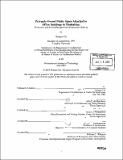Privately owned public space attached to office buildings in Manhattan : economic and urban perspectives of incentive zoning
Author(s)
Cai, Hongyu.
DownloadFull printable version (21.73Mb)
Other Contributors
Massachusetts Institute of Technology. Dept. of Urban Studies and Planning.
Advisor
John P. de Monchaux and Henry O. Pollakowski.
Terms of use
Metadata
Show full item recordAbstract
This thesis examines the Incentive Zoning Policy of New York City from economic and urban perspectives. In the first part, it evaluates empirically the economic contribution of privately owned public space to the value of the office buildings to which they are attached. An economic model is postulated to predict the equilibrium rental behavior as a function of a series of independent variables, including a dummy variable representing the existence and the quality of privately owned public spaces. The model is tested against disaggregated cross-sectional data from a set of 475 office buildings in downtown and midtown Manhattan. Results confirm a strong economic influence of privately owned public spaces on office rents. Office buildings with favorable privately owned public spaces are predicted to extract $5.05/sq. ft. more in rent annually, a premium of 12.3% over the $41.03/sqft average annual rate. Based on the rating system defined by Jerold Kayden, on average, for each level increase of quality, there is $1.36/sqft of value (a premium of 3.3%) added to the annual rent, which can further be translated into a premium in the property value when properties are sold. The second part of the thesis addresses the possible impact that this result may bring to the different players in the process of urban development, including developers, owners, tenants, urban designers, and city planners. In particular, the thesis explores how the economic benefit illustrated by this research might change the often reluctant attitude of the private sector regarding the maintenance of these privately owned public spaces. Further investigation also reflects on the lessons learned from the more than 40 years history of incentive zoning practice in New York City. Potentials issues for further study are also put forward.
Description
Thesis (S.M.)--Massachusetts Institute of Technology, Dept. of Architecture; and, (S.M.)--Massachusetts Institute of Technology, Dept. of Urban Studies and Planning, 2003. Includes bibliographical references (leaves 93-94).
Date issued
2003Department
Massachusetts Institute of Technology. Department of Architecture; Massachusetts Institute of Technology. Department of Urban Studies and PlanningPublisher
Massachusetts Institute of Technology
Keywords
Architecture., Urban Studies and Planning.